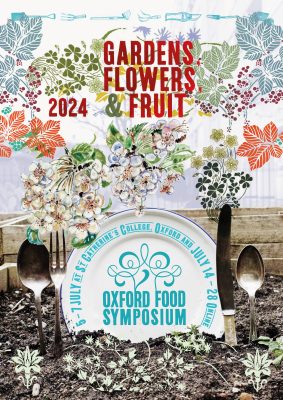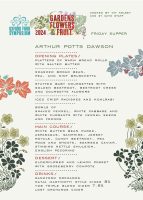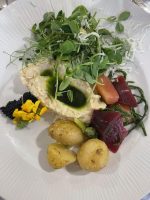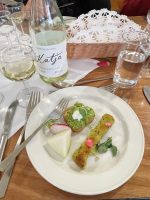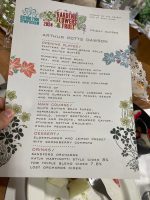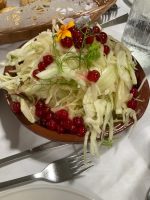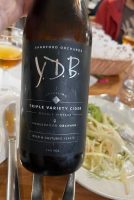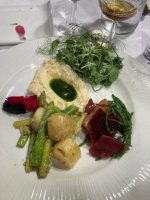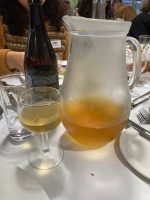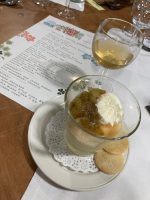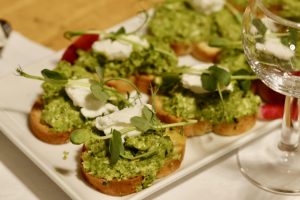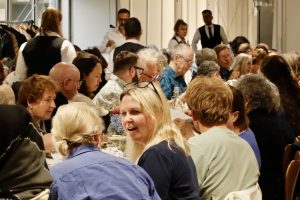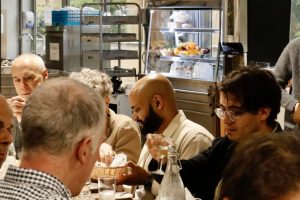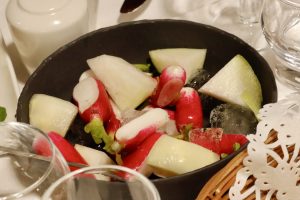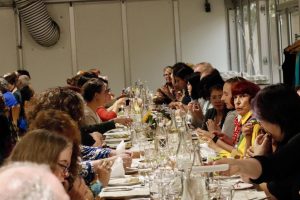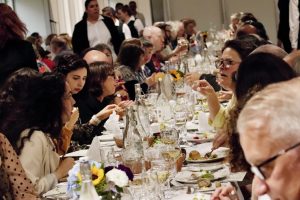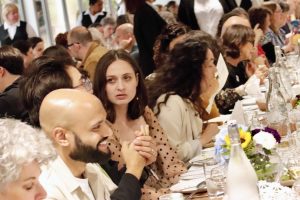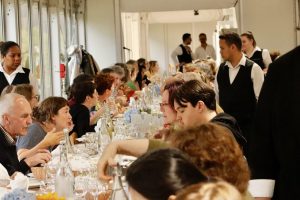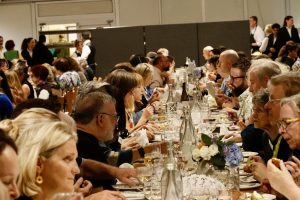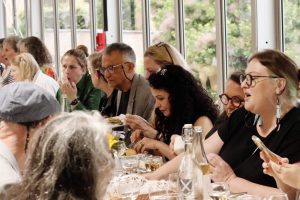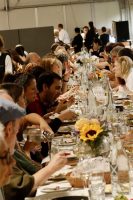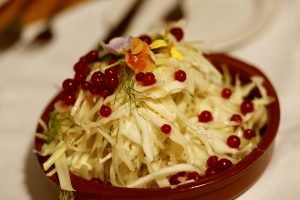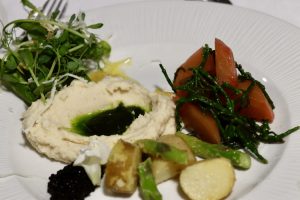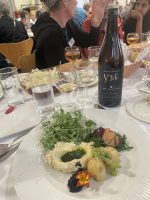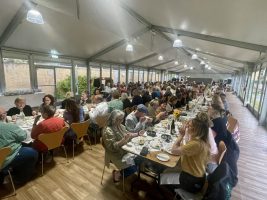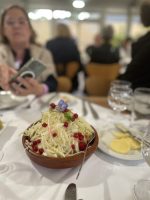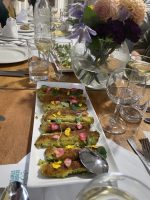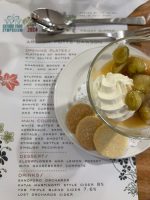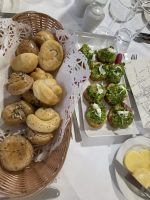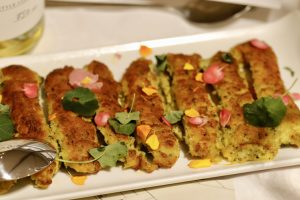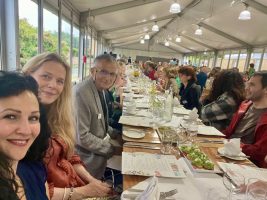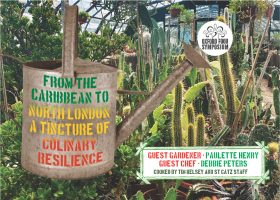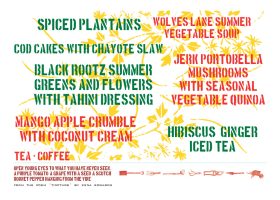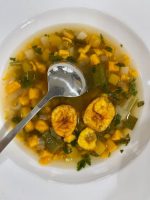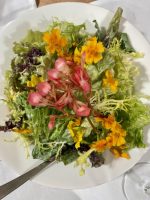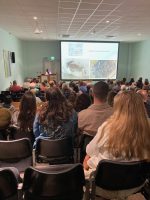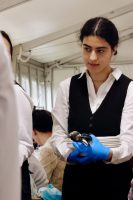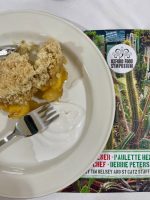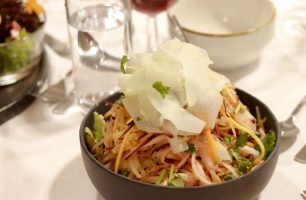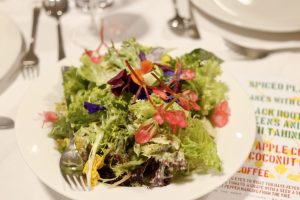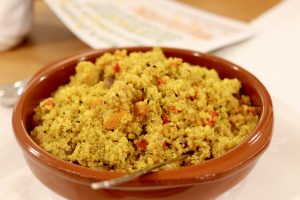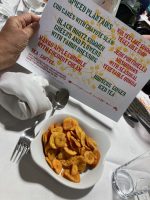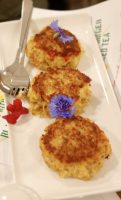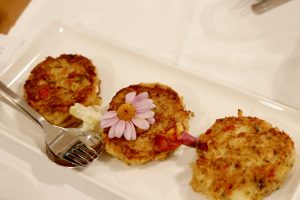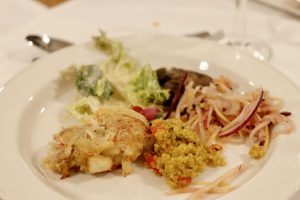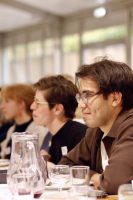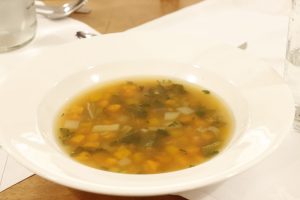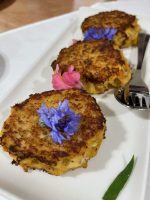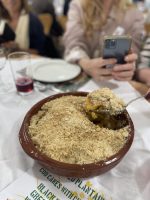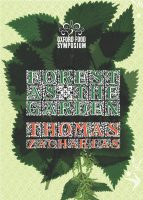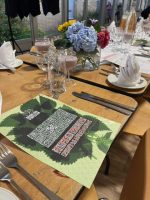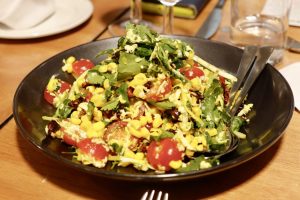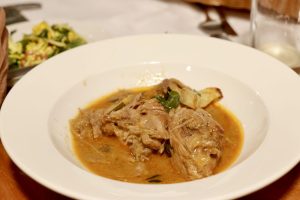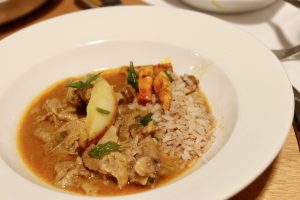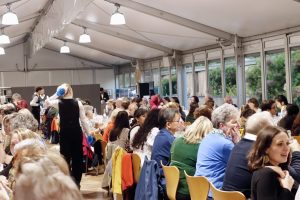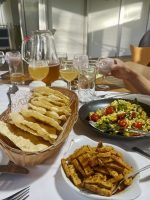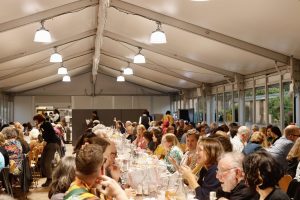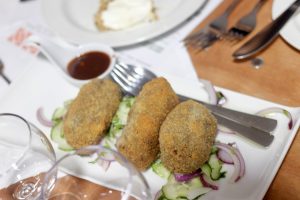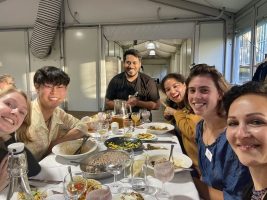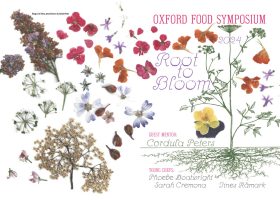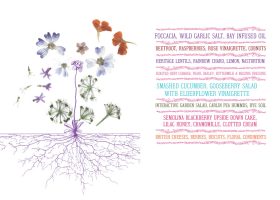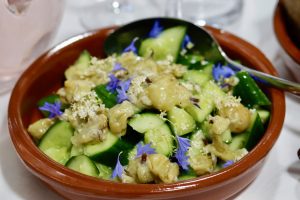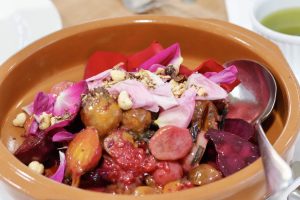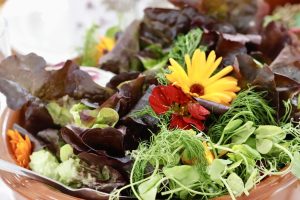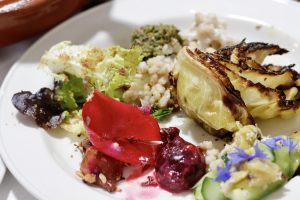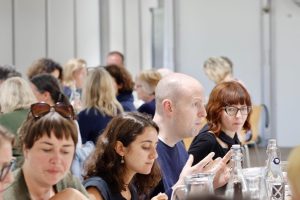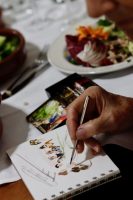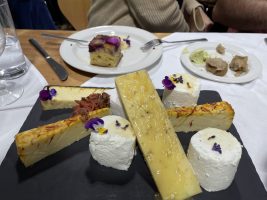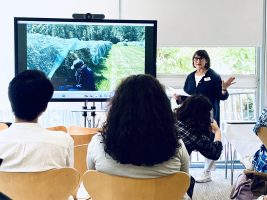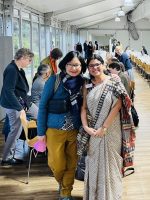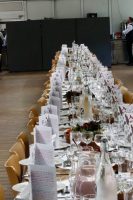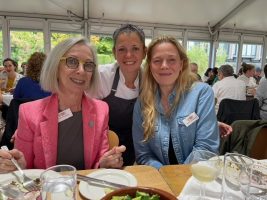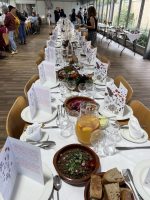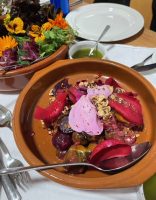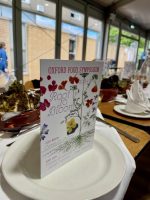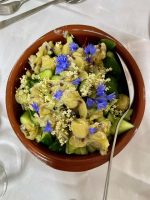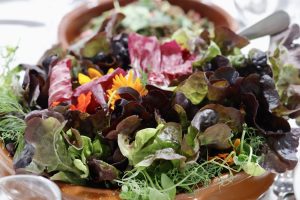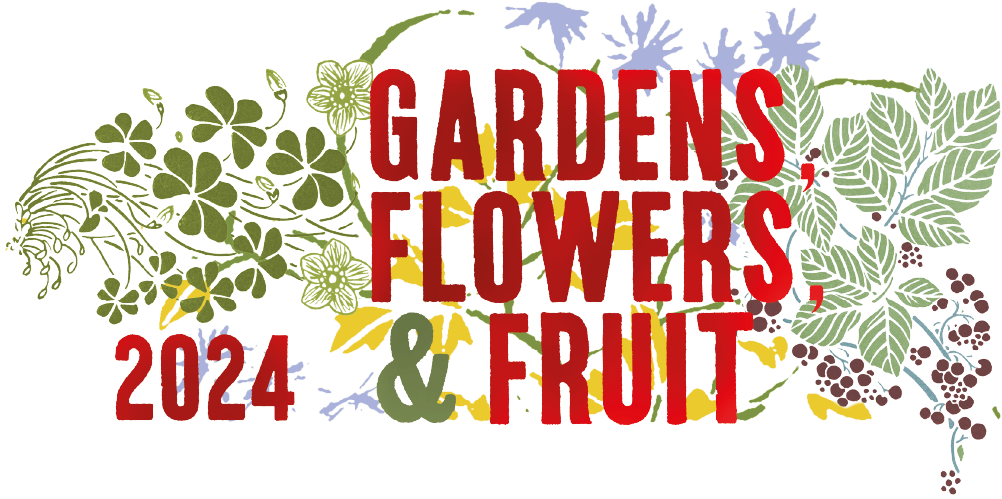
A few words about 2024…
2024’s symposium took us from the usual Arne Jacobsen buildings at St Catz into newly erected pavilions that rather fittingly put us right in the middle of the College gardens. Two hundred weekend symposiasts were welcomed by a wall of jasmine blossom that greeted us onto our new campus.
The topic of ‘Gardens Flowers & Fruit was explored most extensively through three highly original keynotes, and 46 papers and presentations, then experienced through curriculum- based meals and inspiring after-dinner activities.
An additional 100 symposiasts joined the online conference for more discussion by all symposiasts on the papers and the chance to engage further with the guest chefs, keynote speakers and special editions of our other regular online events The Kitchen Lab, the Sifter’s The Ask, and Wiki Club. We changed the conversation, expanded the table, and improved the plate with renewed vigour and joy.
Cathy Kaufman’s Report
Steely-hued skies and chilly temperatures greeted the 220 symposiasts who traveled to St Catherine’s College for the July 5-7 opening weekend of the 2024 Symposium. Not only was the cool summer weather atypical, sending many symposiasts sweater shopping on High Street Friday morning, but symposiasts faced a new campus geography when essential repairs closed the Arne Jacobsen lecture and dining halls, disrupting the year-round functioning of the College. While the ability to host the symposium had been in doubt until mid-January, the resourceful St Catz crew rallied to the challenge, erecting temporary lecture, seminar, field kitchen and dining spaces in the under-explored St Catz gardens. And the rainy summer had its rewards: the high wall of jasmine that scented our path to the dining hall and the luxuriously verdant vistas from those classrooms and dining hall serendipitously made the perfect setting for Gardens, Flowers, and Fruits.
Friday afternoon opened with Carolyn Steel’s keynote address, introduced by Chair Emerita Elisabeth Luard. Steel’s talk, ‘Gardens: How our modification of nature expresses our evolving sense of our place in the world,’ was a tour de force of lavishly illustrated garden history, dashing through millennia of environmental manipulations in a never-ending quest to make nature conform to our whims and needs. Her expanded recorded version of the keynote is well worth watching. Her overview of garden history flowed seamlessly into the framing of our Friday night dinner, A Rhapsody of Greens: From the Gardens of Oxford, devised by guest chef Arthur Potts Dawson and executed by St Catz’s Chef Tim Kelsey and his team. The intellectual Potts Dawson anchored our dinner around the impeccable local bounty of greens, fruits, and dairy products, nearly all sourced within a few miles of St Catz. His framing talk emphasized the importance of local foods for gastronomic and environmental reasons.

Plenary sessions
Keynotes
Carolyn Steel
Annalisa Marzano
Cristina Mazzoni
Richard Shepro
OFS Young Chefs
Pheobe Boatwright, Sarah Cremona and Jines Råmark
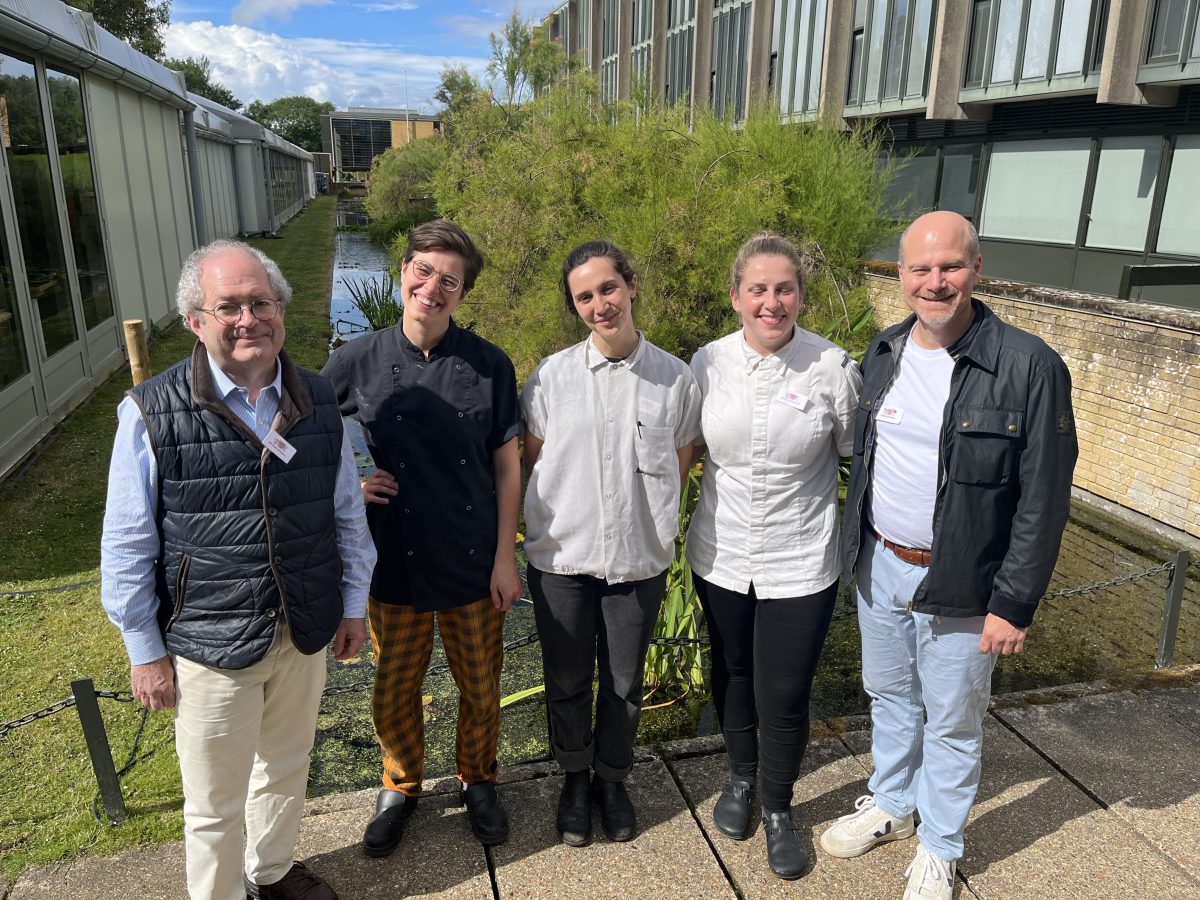
Tools
The OFS Wiki-Club
Wiki-editing session with Roberta Wedge
The Sifter
The cyberworld of cookbooks in a searchable database

Meals & Receptions
Friday Dinner
Rhapsody of Greens – From The Gardens of Oxford
Devised by – Chef Arthur Potts Dawson and Chef Tim Kelsey and the St Catz team
Welcome drinks – Homemade cordials (elderflower; tomato cucumber olive oil shots) by Gerhardus Geldenhuis, Hundred Hills Signature Sparkling Rose 2018
To start – Platters of warm bread rolls with salted butter, smashed broad bean, pea, and mint bruschetta, stuffed baby courgettes with golden beetroot, beetroot cress and courgette flowers. Iced crisp radishes and kohlrabi, bowls of shaved fennel, white cabbage and white currants with fennel seeds and fronds
Main course – White butter bean puree, asparagus, samphire, Jersey Royals, candy beetroot, pea pods and shoots, seaweed caviar, stinging nettle emulsion, English pecorino
Dessert – Elderflower and lemon posset with gooseberry compote
Ciders – KATJA (Martinotti Style Cider 8%) Sandford Orchards, Y.D.B Cider 7% Sandford Orchards, Rare ‘Lost Varieties’ Apples Cider Sandford Orchards
Saturday Lunch
From the Caribbean to North London a Tincture of Culinary Resilience
Devised by – Paulette Henry, Chef Debbie Peters with Chef Tim Kelsey and the St Catz team
To start – Spiced plantains, Wolves Lane summer vegetable soup
Main course – Cod cakes with Chayote slaw, Black Rootz summer greens and flowers with tahini dressing, jerk portobella mushrooms with seasonal vegetable quinoa
Dessert – Mango apple crumble with coconut cream
To drink – Homemade hibiscus ginger iced tea
Saturday Dinner
Forest As The Garden: Chef Thomas Zacharias
Cooked by – Tim Kelsey and the St Catz team
Welcome drinks – Homemade cordials (ginger pineapple) by Gerhardus Geldenhuis, Roohafza Spritz
To start – Summer millet and vegetable “curd rice”, venison cutlets / raw banana and banana blossom cutlets
Main course – Ammini’s duck curry, Ammini’s wild mushroom curry, Wild greens Thoran salad, matta rice, pappadum, and wild bamboo shoot pickle
Dessert – Black rice payasam with mahua and summer berries
Drinks – False Economy Lager 4.8% Tap Social Brewery
Time Better Spent IPA 5.1% Tap Social Brewery
Sunday Lunch
Root to Bloom, guest mentor Cordula Peters
Devised by – Young Chefs: Phoebe Boatwright, Sarah Cremona, Jines Råmark with Tim Kelsey and the St Catz team
Welcome drinks – Homemade cordials (rhubarb and lemon; blackcurrant) by Gerhardus Geldenhuis
To start – Foccacia, wild garlic salt, bay infused oil, beetroot, raspberries, rose Vinaigrette, cobnuts
Main course – Heritage lentils, rainbow chard, lemon, nasturtium. Roasted hispi cabbage, pearl barley, buttermilk and begonia dressing. Smashed cucumber, gooseberry salad with elderflower vinaigrette. Interactive garden salad, carlin pea hummus, rye soil
Dessert – Semolina blackberry upside down cake, lilac honey, chamomille, clotted cream. British Cheeses, berries, biscuits, floral condiments
To drink – Homemade summer stone fruit sangria
After dinner events
Elisabeth Luard and Birgette Kampmann
‘Fandango’, painting your botanically-inspired fan,
Nader Mehravari
Saffron: From Cultivation, to Harvesting, and Steeping
Gerhardus Geldenhuis
Cordially Yours
Linda Roodenberg
An evening stroll through the Botanical Gardens of the FoodMuseum
Parallel sessions & papers


